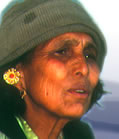THEMES IN THIS
TESTIMONY
Agriculture

Education

Family Life

Identity

Migration

Social Relationships

Click on arrows
to find more
testimonies
featuring
these themes
|
|
Sex
|
female
|
|
|
Age
|
25
|
|
|
Identity
|
Hindu
|
|
|
Occupation
|
farmer/service
|
|
|
Location
|
Thakani VDC, Sindhupalchowk
|
|
|
Date
|
1994
|
|
summary
The interview offers insights into women's daily lives and the various forms of discrimination they face. The narrator feels that men have “the upper hand” in almost every aspect of life – “I personally think that whatever I earn, that belongs to me, but the men have a different attitude. In the village, we hear men blaming the women for enjoying their wealth, they blame us for trying to be superior to them, the women are suffering and the men are enjoying their life”. She believes that women feel pulled in different directions with their various responsibilities for children, home and farm work.
She does not feel that all men are bad. In her opinion, there are two kinds of men - those who confer with their wives on important decisions and those who don't; those who let women manage money and those who don't. The latter kind don't care about children's welfare, don't take their wife's advice, don’t give her money, and drink too much alcohol. However, she does feel that gender relations are changing for the better. Women used to have to eat after their husbands, and always show respect, and this is no longer the case. They can also participate in more of the decisionmaking, albeit to a limited extent – “nowadays, we both can discuss and decide, but the main decision is always made by men”. She admits that she is lucky, because in her family “there is no discrimination at all” and this is very rare in her village, where “there are only a few families where women are as happy as their husbands”.
detailed breakdown
|
You will need a password from Panos to view the full
transcript of the interview. To apply for a password, click here.
Once you have a password, click here to go to the beginning
of the transcript. You can also click on any section of the
breakdown of content below and go straight to the
corresponding part of the transcript.
|
| Section 1-3 |
Description of her daily chores. Says men are idle at home. "Only the women get up early ... men say they are tired and want to rest; they just sleep.”
Problem of women having no wealth recognised as their own.
Mentions abuse suffered by some women at hands of in-laws.
The money husbands earn is generally kept by them and “women have only the flour and rice... whenever we need some money we have to ask the men”
Briefly describes waged work poor women do.
|
| Section 4-5 |
There is drinking and wife-beating in other communities, but not hers (Brahmin). Unequal pay for women when they help with ploughing work. Men sometimes go to India to find work, and never return. But women are tied to home and children. "The men can go away for 15 days without any information, but for women they cannot go away even for a day."
Some men are angry with their wives and “The parent-in-laws are always angry with the daughters-in-law, they don't give them enough to eat, not as much as they give their son...some women even died.”.
|
| Section 5-7 |
“There is discrimination in clothes also.” Some women aren't given enough to wear and must constantly repair their clothes.
In-laws show favouritism toward their preferred daughters-in-law; complain about the others no matter what they do. These problems are more common in rich families; in poor families, everyone has to work hard and there is more harmony.
Attitudes towards female education have changed: “They have a positive thinking about it... They don't want to keep their daughters in darkness, so they are sending their daughters to school.”
|
| Section 7-8 |
She thinks that, these days women don't have to marry or work in the fields; if they are educated they can get office jobs and even save for the future.
Issue of women being “taken away” by men, or running away, becoming pregnant before marriage and having abortions.
|
| Section 8-9 |
After childbirth, women are fed properly and don't have to work for up to two months.
In the past women couldn't talk to unrelated men without people gossiping, but now they can.
Talks about two kinds of men, one who “will sell without conferring with his wife and spend the money on alcohol and doesn't give the wife anything. The other kind who doesn't drink alcohol will usually confer with the wife and gives the wife money to keep.”
|
| Section 10-11 |
“In this village people don't drink alcohol, so they don't beat the wives, but in other places they do.”
Women do most of the work in preparing for festivals; some men will help, though not "the kind who thinks he is king”. In poor families, the husband will help out, e.g. by bathing the children, "but in the rich family only the women do all this work and the husband never helps.” The situation is the same in all castes.
Gender inequality results from a “very old system”.
|
| Section 12-13 |
Describes dress code for widows and views on remarriage: “I think the women should be able to marry again. But the custom won't let us.”
Different castes have different marriage arrangements.
Agrees with system that daughters should take some of their parent’s wealth on marriage
|
| Section 14-15 |
Reasons she wants her daughter to marry a rich family.
Women’s property rights: “If the husband is alive then everything is in his name, but if the husband is dead she won't be eligible till she is 35... I feel at least the properties should be in both husband’s and wife's names, so that if the husband brings another woman or gives us hard time then we can sell whatever belongs to us and survive.” Says there’s a common fear that women might abandon families if they had property rights. |
|


